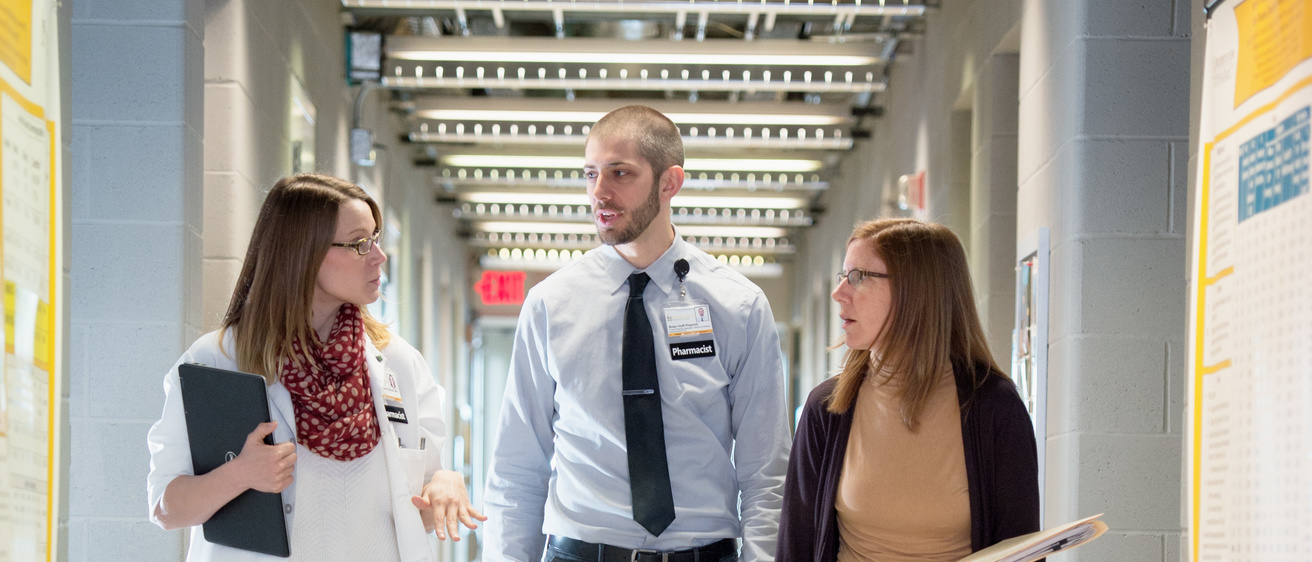Rampant use of antibiotics in our society has led to an ever-growing number of “superbugs”: drug-resistant bacteria. By using antibiotics optimally – called stewardship – Erika J. Ernst and her team are slowing down superbugs.
Ernst, PharmD, is an associate professor in the Division of Health Services Research (HSR) within the Department of Pharmacy Practice and Science (PPS). She also works as a clinical pharmacy specialist on the University of Iowa Hospitals and Clinics (UIHC) antimicrobial stewardship team. Her research evaluates the effectiveness of the team’s clinical efforts.
“Our college and UIHC partner on stewardship projects, and everybody benefits, especially patients,” said Ernst.
She has recently collaborated with Diana Karkow, when she was a pharmacy fellow, now a clinical pharmacist, Brian Hoff, clinical pharmacy specialist and Brad Ford, director of the clinical microbiology laboratory on a Society of Infectious Diseases Pharmacists (SIDP) grant to tailor antibiotic use for serious hospital-acquired Staph infections. One of the worst types of bacteria – Methicillin-resistant Staphylococcus aureus (MRSA) – must be treated initially with broad spectrum antibiotics, contributing to resistance. Yet much simpler drugs can easily wipe out other types of Staph. Currently, testing can take a day or more to come back, so physicians often have no choice but to give patients the strongest possible broad spectrum antibiotic.
“By using fewer antibiotics, you can lessen the amount of Staphylococcus aureus bacteremia,” said Ernst. “We’ve worked out a system to quickly determine who needs what, and then put patients on the most narrow antibiotic as quickly as possible.”
The researchers are the first to use this rapid screening test to quickly determine if a weak or strong antibiotic is needed. The team will arm hospital pharmacists with this tool to save the strongest antibiotics for the most resistant Staph infections.
Ernst also collaborated with hospital and college partners – including fellow PPS faculty member Mary Schroeder, PhD – to determine the most economical way to treat mild to moderate infections with Clostridium difficile (C. diff): another superbug. The team found that the typical first-line treatment (Metronidazole) is less effective and more expensive than another modern treatment (Vancomycin).
In the past, Ernst completed in vitro and biological studies of antifungal agents, and looked at the effects of drugs on the body or organism.
Ernst has been a leader as well as a member of the SIDP. As a member, she collaborated to recommend future training and certification of pharmacists who practice, mentor, and educate in infectious diseases pharmacotherapy.
Ernst grew up in California. She earned a Doctor of Pharmacy from University of Southern California in 1992, followed by a PGY1 pharmacy practice residency at the USC School of Pharmacy. She completed a two-year Infectious Disease Fellowship at the University of California, San Francisco before joining the College of Pharmacy faculty in 1995.
Ernst is married to Michael Ernst, PharmD, a clinical professor in the College of Pharmacy and in the Department of Family Medicine, Carver College of Medicine. They have three children.
Author’s note: Antibiotics are a type of antimicrobial, and Ernst works at the antimicrobial level. For purposes of readability we use the term “antibiotic” in this article, the layman’s term, although Ernst also works with antiviral and antifungal drugs.
